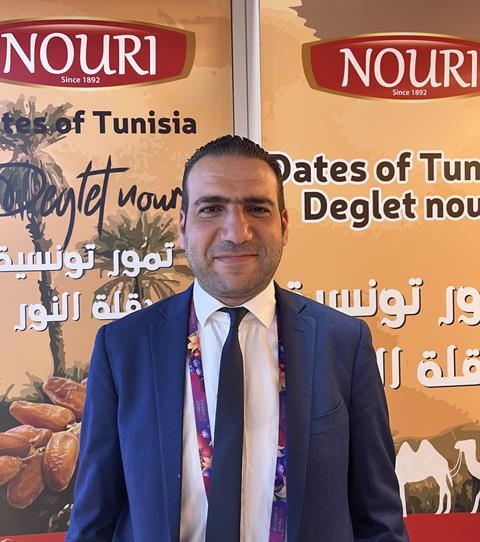Dates are helping to meet rising demand for healthy sweet foods, and Tunisia’s Deglet Nour variety, sold with the branch attached, offers an extra visual appeal
In the world of dates, Tunisia holds a special status, particularly when it comes to the prized Deglet Nour variety. For Mohamed Amine Boumaiza, export manager of Nouri Dates, a Tunis-based supplier that has been exporting dates since 1981, it’s not just about business – it’s about tradition, identity and a deep knowledge that has been passed down over generations.
“We only do dates,” says Boumaiza. “And we only focus on Deglet Nour. That’s our expertise.” While many countries grow dates, Tunisia’s natural environment – its soil, climate and heritage – gives its product an edge that’s difficult to replicate. “When other countries tried to grow the same trees, they didn’t get the same results. The taste, the texture – it just wasn’t the same.”

Deglet Nour, often referred to as the “queen of dates”, grows especially well in Tunisia’s arid conditions. “It’s a gift of the soil,” says Boumaiza. “This is our climate, and we know how to grow in it.”
His team works with the environment, not against it—an approach that’s increasingly relevant in a world dealing with climate change.
There’s also a distinct visual appeal to Tunisian dates. “We sell them with the branch,” Boumaiza explains, “which gives the product a more premium look. Only Tunisia and Algeria do this. Everywhere else, it’s just loose dates in a box.”
With exports to over 40 countries, the company is targeting growth in Asia, particularly in countries with large Muslim populations like Indonesia, Malaysia and India, where demand spikes during Ramadan. However, China remains a challenge. “Many people there don’t know Tunisia,” says Boumaiza. “They confuse it with Indonesia. Next year, we’ll label the packaging with a map!”
Organic is another growing niche, particularly in Europe. “Germany is number one for organic,” he says, with France, Spain and the UK following. But it’s not easy. “It’s hard to guarantee enough organic volume year to year. You test, it looks good, but nature is unpredictable.”
However, as global consumers seek healthier foods, Tunisia’s date growers are well-placed. “It’s one of the healthiest sweet products you can eat,” says Boumaiza. “And with no additives, no stuffing, just the date, it’s real.”



